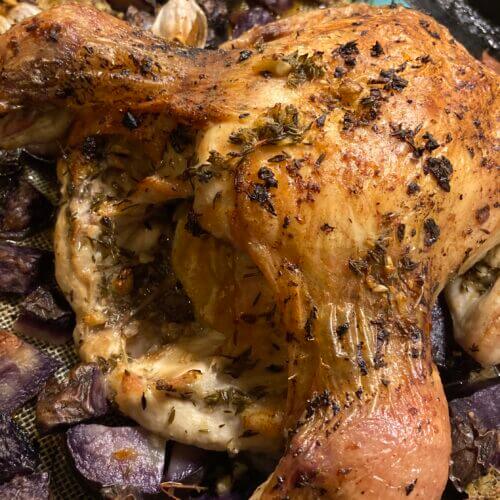Stupid Easy Sunday Chicken Roast Dinner
There’s a reason chicken roast dinners are in every cookbook ever. It’s also the most deceptive dish out there: the finished product looks and tastes way too good for how little you have to work for it. The hardest part is getting used to handling a whole chicken (which isn’t hard).
We had potatoes with it (rescued with Oddbox – here’s a cheeky £5* discount on your first box). Feel free to add carrots, parsnips, onions, or any other combo of root vegetable.
We’ve added a preserved lemon to the sauce to make this vaguely Mediterranean, but it’s completely optional.
Shop local where you can. Your local butcher will sell you a chicken cheaper than you’ll get at Sainsbury’s or Ingles (we paid £3 ($3.75) for ours).

Stupid Easy Chicken Roast Dinner
Equipment
- Oven
- Chef's Knife
- Microplane or Cheese Grater
- Baking Sheet + tin foil (or baking mat)
- Basting Brush (optional)
- Instant Read Thermometer (optional)
- Food Processer (optional)
Ingredients
- 1 Whole Chicken (approx. 1.3 kg or ~3 lbs)
- 120 ml Vegetable Oil (4 oz)
- 15 gr Thyme (3 tbsp)
- 1 Lemon (Zest and Juice)
- 1 Preserved Lemon optional
- 8 cloves Garlic (4 cloves for marinade, 4 to roast)
- 1 kg Potatoes (2.5 lbs)
- Oregano (for the potatoes — to taste, we used 2 tbsp)
- Salt
- Pepper
Instructions
- Let's start by preheating up the oven to 200° fan and bringing a pot of water to a boil.
- To prep the potatoes: scrub them in the sink (we're gonna keep the skin on to get that crunch) and cut them into bitesized cubes (approx. 1.5 cm/0.5 in, but up to you). When the water comes to a boil, salt the water and throw the potatoes in for 7 minutes.
- While the potatoes parboil (the fancy French term for partly cooking via boiling), let's make the lemon-thyme oil for the chicken. If you have a food processer: combine the thyme leaves, lemon zest and juice, a generous bit of salt and pepper, with half the oil (60ml), 4 cloves of garlic and preserved lemon (if using) into the processer bowl. Pulse until mixed thoroughly. If you don't have a processer: mince the thyme, mince the 4 cloves of garlic (or run it over your microplane), and mince the preserved lemon (if using). Combine with oil, lemon zest and juice and salt & pepper. Whisk with a fork, quite furiously.
- Now, to baste: if you have a basting brush, cool. If not, use your hands.We want the chicken skin to be nice and crispy while maximising the lemony/thymy flavour. The best way to do this is to add most of the mixture to the meat under the skin. With the chicken's legs facing you, breast side up, the skin should be separated from the thighs, allowing you to baste the breasts and legs underneath the skin (see the rather disturbing picture). Try not to tear the skin, but don't worry if you do. Baste a bit of the skin as well, but not too much. Be sure to leave some sauce remaining, because we'll be adding more to the chicken while it cooks. Put your chicken in the centre of the baking pan (which you'll want to cover with tin foil or a baking mat). If you're using tin foil, brush some oil onto it before adding the chicken so nothing sticks.
- To return to the potatoes: after they've boiled for 7 mins, drain them and let rest for 5 mins. Here, some folks like to "fluff" them with a fork for texture, pressing down on them softly. We never bother, but feel free to experiment. Transfer to a mixing bowl and cover with remaining vegetable oil (60 ml) and a generous helping of salt. Mix together then pour them over the baking sheet around the chicken. Crush the remaining 4 cloves of garlic but leave the skin on. Scatter them around the potatoes,
- Throw it in the oven. It will cook for 50-60 mins, but you'll want to add more of the sauce to the chicken every 20 mins (on top of the skin this time, and baste it liberally). Set your timer accordingly. Now you're basically done. Go drink. At around the 50 min mark, the potatoes should be rather crispy and the chicken should have a nice brown tan. If you're using an instant read thermometer, put it in the centre of a breast. Once it gets to 70º C/ 160º F, you can pull it. But if you want to leave it in for an even crispier flavour, feel free to. One of the beautiful things about a whole chicken is that it stays quite moist even if the meat is above the ideal serving temperature. Once the roast is pulled, sprinkle some of the oregeno over the potatoes to taste. Now would be the best time to take a picture. We're personally not very good carvers, and the chicken won't look any better after you've sliced into it.
While you drink…
Roasts, in general, are one of the easiest ways to make serious meals that leave an impression in your mouth. They’re simple and flexible. They are great dishes for hosting, not just because of their large serving size, but also because once the ingredients are in the oven, you can focus on entertaining and chatting shit to your guests. They’re also great for leftovers (as we proved here), which means you don’t need friends to justify such a big meal. The potatoes and meat know how to take a reheat in the couple of days after you’ve cooked it.
It’s no wonder why the concept of a Sunday roast has become central to British cuisine and culture. What better way to stave off the existential horror that mounts as Sunday evening creeps closer and the dread of another week of work rears its terrible head than to have a roast and a few pints?
While roasts in pubs are wonderful, one of the more tragic casualties of COVID-19 is no longer being able to enjoy them in a pub. We haven’t tried the take-away option many pubs are now offering, and why bother when you can do it yourself at home?
The experience of cooking chicken roasts is one to be considered from start to finish: all of the ingredients come together to be cooked at the same time, meaning you’re not rushing or trying to manage multiple pots on the stovetop. In fact, because it all takes place in the oven, the cleanup process is minimal and you’re not left with a messy stovetop you have to worry about procrastinating to clean. While it cooks, your house is filled with wonderful aromas as the herbs and meat combine their flavours in the oven… It is the definition of heritage style cooking.
On the Concept of British Sunday Roasts
This here chicken roast is not, strictly speaking, a British roast, especially with the preserved lemon. Though it very much could become British if you ditch it and add a Yorkshire pudding (a very airy and light pastry), diversified the root vegetables by adding carrots/parsnips, and make a pan sauce with the chicken drippings. So there’s very little getting in your way if you want a proper British Sunday chicken roast.
Other ways you can (re)imagine the dish is to add veggies cooked on the stovetop. We had asparagus with ours, but green beans would work as well. Broccoli roasted with the potatoes (or cooked in other ways) is another option. There are very few veggies that come to mind that wouldn’t work with a chicken roast if you consider it. Which is why, ultimately, the concept of a roast transcends mere national cultures and is a staple of many different cuisines.
Food for Thought
Yorkshire puddings exist to mop up the gravy that comes from a chicken roast. We personally prefer bread ourselves, ideally sourdough. Which is also what we’re using the next day to eat leftovers.
In Italian, mopping up the sauce with bread is called scarpetta. Literally “small shoe”. The point is, good sauces shouldn’t go to waste, and the chicken fat flavoured with lemon and thyme is 10 out of 10 good. If there is leftover gravy, put it in a tupperware container with the potatoes and reheat the following day and scarpetta it then.
